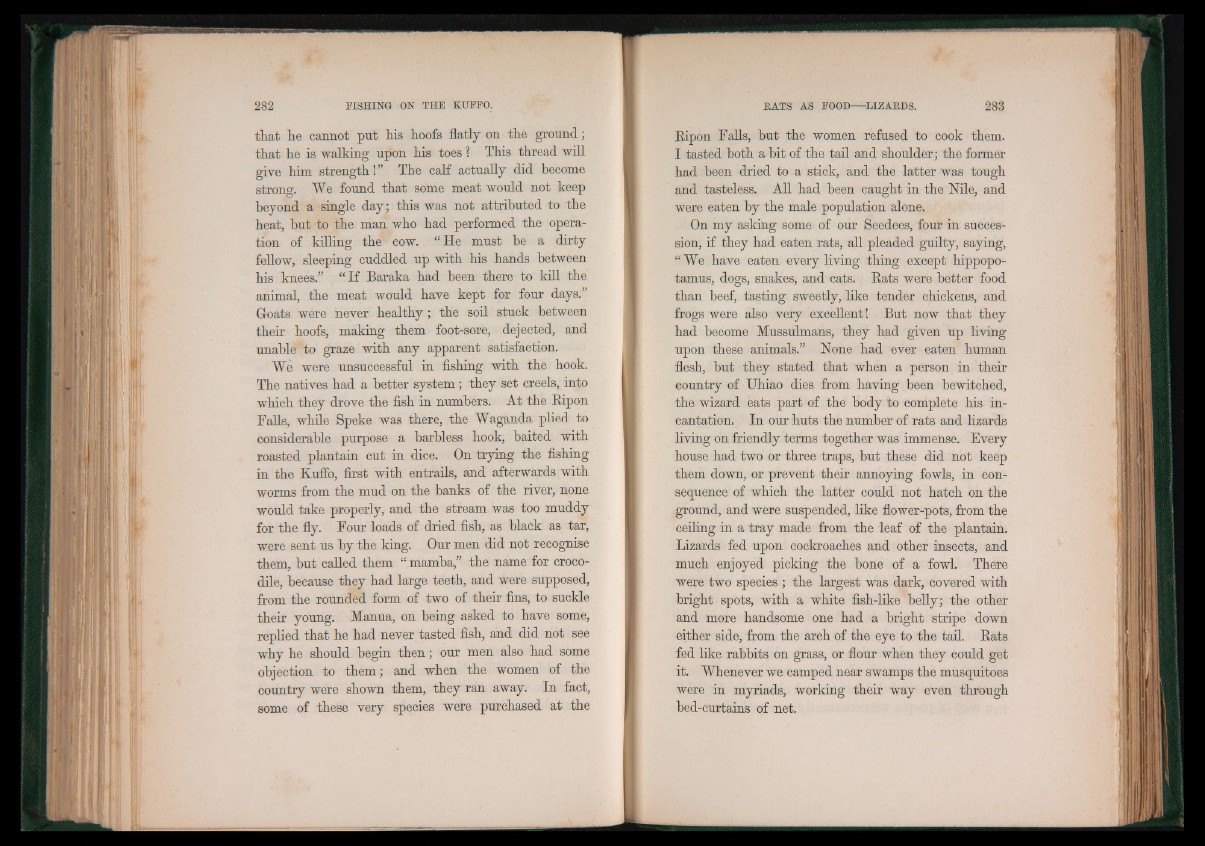
that he cannot put his hoofs flatly on the ground;
that he is ■walking upon his toes ? This thread will
give Atm strength!” The calf actually did become
strong. We found that some meat would not keep
beyond a single day; this was not attributed to the
heat, hut to the man who had performed the operation
of killing the cow. “ He must he a dirty
fellow, sleeping cuddled up with his hands between
his knees.” “ If Baraka had been there to kill the
animal, the meat would have kept for four days.”
Goats were never healthy; the soil stuck between
their hoofs, making them foot-sore, dejected, and
unable to graze with any apparent satisfaction.
We were unsuccessful in fishing with the hook.
The natives had a better system; they set creels, into
which they drove the fish in numbers. At the Ripon
Falls, while Speke was there, the Waganda plied to
considerable purpose a barbless hook, baited with
roasted plantain cut in dice. On trying the fishing
in the Kuffo, first with entrails, and afterwards with
worms from the mud on the banks of the river, none
would take properly, and the stream was too muddy
for the fly. Four loads of dried fish, as black as tar,
were sent us by the king. Our men did not recognise
them, but called them “ mamba,” the name for crocodile,
because they had large teeth, and were supposed,
from the rounded form of two of their fins, to suckle
their young. Manua, on being asked to have some,
replied that he had never tasted fish, and did not see
why he should begin then; our men also had some
objection to them; and when the women of the
country were shown them, they ran away. In fact,
some of these very species were purchased at the
Ripon Falls, but the women refused to cook them.
I tasted both a bit of the tail and shoulder; the former
had been dried to a stick, and the latter was tough
and tasteless. All had been caught in the Nile, and
were eaten by the male population alone.
On my asking some of our Seedees, four in succession,
if they had eaten rats, all pleaded guilty, saying,
“We have eaten every living thing except hippopotamus,
dogs, snakes, and cats. Rats were better food
than beef, tasting sweetly, like tender chickens, and
frogs were also very excellent! But now that they
had become Mussulmans, they had given up living
upon these animals.” None had ever eaten human
flesh, but they stated that when a person in their
country of Uhiao dies from having been bewitched,
the wizard eats part of the body to complete his incantation.
In our huts the number of rats and lizards
living on friendly terms together was immense. Every
house had two or three traps, but these did not keep
them down, or prevent their annoying fowls, in consequence
of which the latter could not hatch on the
ground, and were suspended, like flower-pots, from the
ceiling in a tray made from the leaf of the plantain.
Lizards fed upon cockroaches and other insects, and
much enjoyed picking the bone of a fowl. There
were two species ; the largest was dark, covered with
bright spots, with a white fish-like belly; the other
and more handsome one had a bright stripe down
either side, from the arch of the eye to the tail. Rats
fed like rabbits on grass, or flour when they could get
it. Whenever we camped near swamps the musquitoes
were in myriads, working their way even through
bed-curtains of net.